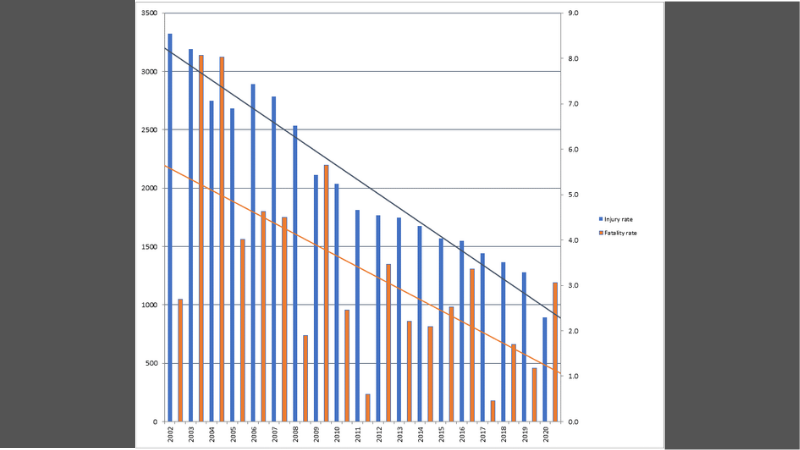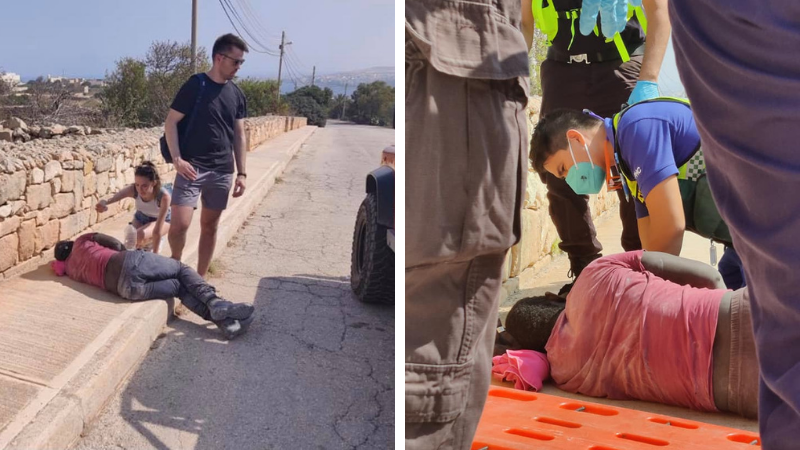After the publication of shocking images of a terrified 32-year-old man who was injured on a construction site in Mellieħa and dumped on the pavement in nearby Selmun by his employer, key stakeholders, politicians, activists and citizens alike have voiced their outrage over the incident.
According to news reports, the police were questioning an individual who may be responsible for having left the man on the side of the road after telling him that he would take him to the hospital. Investigations are ongoing.
The Times of Malta named the man being interviewed as Glen Farrugia, one of the two shareholders and directors of J&G Farrugia Contractors Limited, which manages the site in Mellieha.
The Kamra tal-Periti (Chamber of Architects) said in a statement that “this is a stark reminder that some industry operators are yet to reach basic levels of responsible behaviour grounded in humanity and compassion”.
It called for the government to introduce a licensing regime for contractors and insisted that the regulations should include provisions for sanctioning or barring any contractors found to be responsible through negligence for serious injury or loss of life of their workers or neighbours that would also be applicable retrospectively.
The Chamber said “cowboy operators” must be shown that the industry’s main stakeholders will adopt “a zero-tolerance policy towards behaviour which is inhumane, exploitative, and negligent to its labour force”.
Target the black economy
The Malta Employers’ Association called for the “elimination of the black economy” as one of the main solutions to inhumane working conditions, referring to the incident in Selmun as “obscene” and “unacceptable in a civilised society”.
“We really need to crack down on the black economy,” Joseph Farrugia, president of the Malta Employers’ Association (MEA), stated. Farrugia was referring to what is also known as the black market, or simply put, any economic activity held outside the regulations imposed by law.
Referring to migrant workers like the Ghanaian national who was rushed to hospital after being discovered by bystanders earlier on Tuesday, Farrugia argued that the key to eliminating precarious working conditions and situations in which employers abuse of their employees is to target the black economy.
“When you have someone in a vulnerable position who needs to earn money to survive at whatever cost, they will accept anything. Long hours, lack of safety procedures, low pay – that’s where the working standards go down,” he said.
According to one of the witnesses who stopped to help the injured man in Selmun, Caroline Galea, the man was worried about being sent to prison, despite of the severity of his injuries, because he’d been working without a permit.
Enforcing standards
“That is what we need to safeguard: our standards. While many seem to think employers are against such standards, we need to state that such standards ensure a level playing field, which is what employers want. When you have different companies with different standards, that means one will be able to undercut the other. The level playing field stops being there. Good pay and good conditions come at a cost, and it’s not fair for those who provide that to lose work to others who behave like cowboys,” Farrugia said.
Reacting to the situation on social media, human rights advocacy organisation Aditus described the incident as “the result of a system that dehumanises the individual as merely a cog in the wheel of an insatiable industry or a burden to society. A society that judges people by the papers they hold, the money they have and the way they cross borders”.
Home affairs minister Byron Camilleri spoke of his government’s stance on migration, stating that it is a “subject that brings with it a lot of challenges” and that he had “faced criticism because the government was too firm and people expected too much”.
In reality, the criticism of Malta’s handling of immigration has been widespread, with prominent EU bodies like the Council of Europe describing Malta’s detention system as “inhumane”, “arbitrary” and “illegal”.
“In spite of these decisions that we take, there is a line that is not crossed; the dignity of every individual, whoever they may be. No worker should be treated in this manner and this is a subject we must work on more,” Camilleri wrote.
Opposition leader Bernard Grech argued that “the generation of money should not come at the cost of humanity”, expressing solidarity with all who are “falling victim to precarious employment”.
Does the construction industry have a safety problem?
According to Occupational Health and Safety Authority CEO Mark Gauci, there were a total of 10 fatal accidents in the construction industry from 2018 – 2020. During the same period, a total of 1,325 injuries were reported.
“The number of fatalities or injuries at work tends to vary from one year to another, and there may be an increase during one year, only to decrease the following year,” Gauci said.
“This is the reason why meaningful conclusions can only be made if one were to consider the number of cases per 100,000 employees and not numbers per year, and the study period is long enough as would allow the identification of trends,” he added, referring to the number of incidents divided by the working population as the main method which the authority uses to analyse trends.

OHSA statistics for reported fatal accidents and workplace injuries since 2002.
Asked whether the authority’s statistics reflect reality on the ground, MEA’s president stated that overall, “there is no doubt” that health and safety have improved over the years.
“To be clear, we don’t want to give the impression that what happened today is in any way excusable just because workplace statistics show that the rate of fatal accidents show the rate of fatal accidents and injuries has gone down over the years,” Farrugia said.
“Nonetheless, one must distinguish between the normal economy and the black economy,” he added, further arguing that “problems are more concentrated in the black economy than anywhere else because it is unregulated”. Farrugia also believes that it is important for the government to “know exactly who is working in Malta”, without relying on approximate figures.
“Even this week, the finance minister admitted that many of those who went back to their country over the last year were working in the black economy. It’s almost as if we’re accepting that it’s a normal situation to have employees working in the black economy. It shouldn’t be; especially not foreigners in their thousands,” Farrugia said.
The Occupational Health and Safety Authority stated that the creator of a workplace risk is ultimately responsible for workers’ safety, with the authority aiming to monitor for compliance and enforcement accordingly.
While Gauci stated that the authority has been “very active” and that it has carried out more than 47,000 inspections and collected more than €1.3 million in fines since it was established 19 years ago, Farrugia believes that better enforcement and quicker issuance of permits for foreigners seeking work in Malta would help eliminate both the black market and, by extension, abusers.
Featured photo credit: Lovin Malta














the good samaritan in reverse
The poor man, after being exploited for I don’t know how long, was thrown on the road. So, not only was he at risk of losing his life after the fall, but left to the mercy of oncoming cars.
I would sue this irresponsible and heartless, greedy contractor for at least half a million, as he had ruined his and his family’s life.
But this is Malta where life is worthless and greed has replaced morals – this thanks to the most corrupt pm malta ever had, as he, together with his corrupt lot had the country’s descent into lawlessness.
While I agree with your comments, I am unsure how easily an immigrant can sue a Maltese citizen…
He has NO chance st all, at the end of day, he will be punished, wait and see.
Shouldn’t the Occupational Health and safety supposed carry out random checks or surprise visits in construction sites to verify if health and safety procedures are not ignored. How many visits are carried out daily. This is the kind of information that is of interest to the public.
No one gives a sh*t about workers health, safety and welfare as they ALL know they are a) unlikely to be caught
b) unlikely to be heavily penalised
c) unlikely to be barred from actually bidding for further contracts for any length of time.
The above makes it very clear that it is ok to carry on with the present practices.